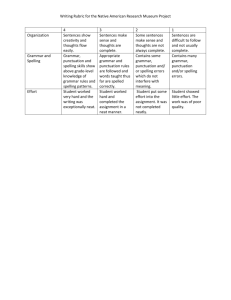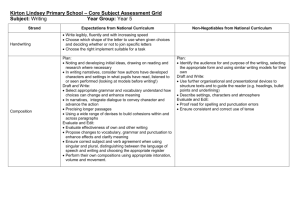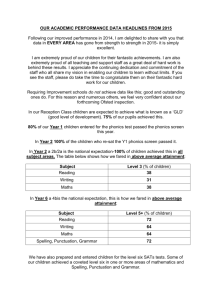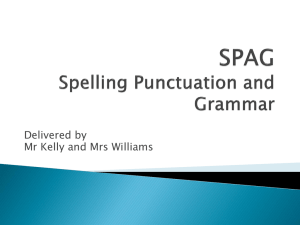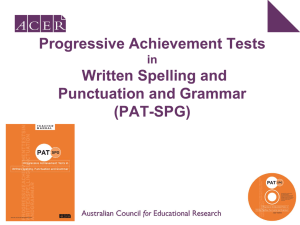Academic Writing
advertisement
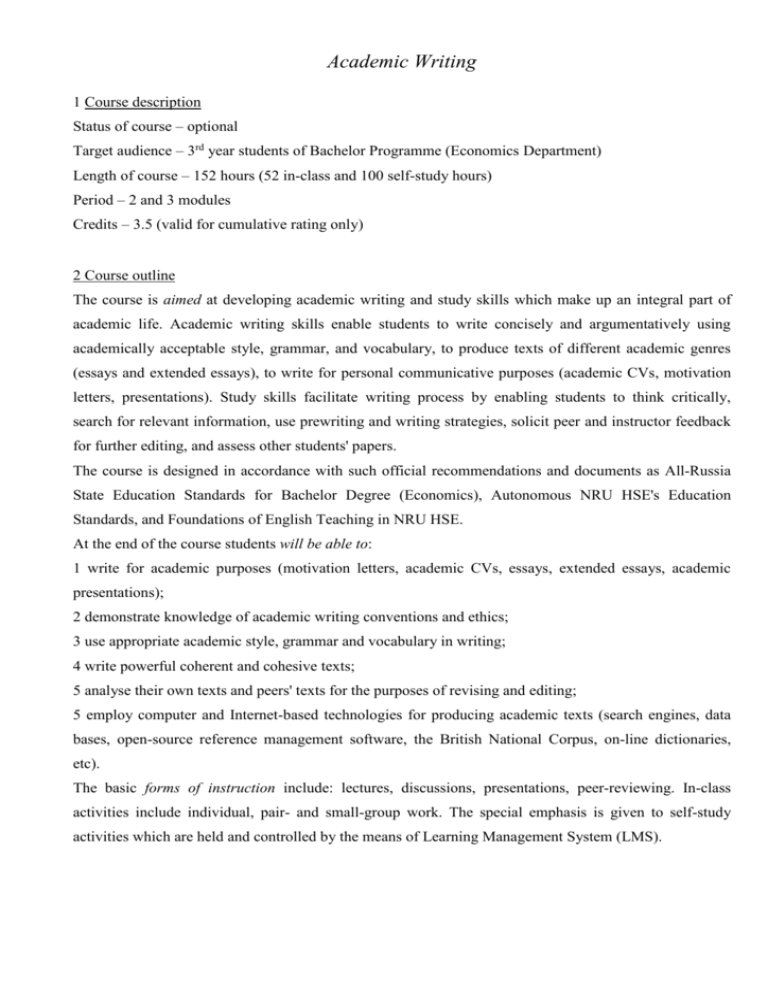
Academic Writing 1 Course description Status of course – optional Target audience – 3rd year students of Bachelor Programme (Economics Department) Length of course – 152 hours (52 in-class and 100 self-study hours) Period – 2 and 3 modules Credits – 3.5 (valid for cumulative rating only) 2 Course outline The course is aimed at developing academic writing and study skills which make up an integral part of academic life. Academic writing skills enable students to write concisely and argumentatively using academically acceptable style, grammar, and vocabulary, to produce texts of different academic genres (essays and extended essays), to write for personal communicative purposes (academic CVs, motivation letters, presentations). Study skills facilitate writing process by enabling students to think critically, search for relevant information, use prewriting and writing strategies, solicit peer and instructor feedback for further editing, and assess other students' papers. The course is designed in accordance with such official recommendations and documents as All-Russia State Education Standards for Bachelor Degree (Economics), Autonomous NRU HSE's Education Standards, and Foundations of English Teaching in NRU HSE. At the end of the course students will be able to: 1 write for academic purposes (motivation letters, academic CVs, essays, extended essays, academic presentations); 2 demonstrate knowledge of academic writing conventions and ethics; 3 use appropriate academic style, grammar and vocabulary in writing; 4 write powerful coherent and cohesive texts; 5 analyse their own texts and peers' texts for the purposes of revising and editing; 5 employ computer and Internet-based technologies for producing academic texts (search engines, data bases, open-source reference management software, the British National Corpus, on-line dictionaries, etc). The basic forms of instruction include: lectures, discussions, presentations, peer-reviewing. In-class activities include individual, pair- and small-group work. The special emphasis is given to self-study activities which are held and controlled by the means of Learning Management System (LMS). 2 3 Syllabus № Topics Total In-class Self- Seminars study 1 Introduction into academic writing at university 38 14 24 1.1. 8 2 6 10 4 6 10 4 6 10 4 6 64 30 34 14 6 8 16 8 8 Academic writing: Genres families Study Skills for Academic Writing: Reading and understanding instructions and assignments Vocabulary for Academic Writing: Key Nouns Grammar for Academic Writing: Nouns: plurals, countable versus uncountable. Genitive. Article. Academic Style: being concise and removing redundancy 1.2. Scholar community and academic etiquette Study Skills for Academic Writing: information sources: how to find what you need Vocabulary for Academic Writing: Key Verbs Grammar for Academic Writing: Passive vs Active Academic Style: paraphrasing and avoiding plagiarism 1.3. What students write for academic purposes. Study Skills for Academic Writing: how to become an effective reader Vocabulary for Academic Writing: Adjectives Grammar for Academic Writing: Comparative and superlative forms Academic Style: political correctness and ambiguity 1.4. How academic writing is different from other forms of writing Study Skills for Academic Writing: surveying material Vocabulary for Academic Writing: Words of Latin and Greek origin Grammar for Academic Writing: modal verbs Academic Style: hedging language 2 Academic Writing in Progress. 2.1. 2.2. Stages of academic writing: Prewriting strategies Study Skills for Academic Writing: brainstorming ideas Vocabulary for Academic Writing: Linking words (I) Grammar for Academic Writing: Relative Clauses (I) Punctuation and spelling (I) Academic Style: coherence Stages of academic writing: Writing Strategies (I) Study Skills for Academic Writing: note-taking and summarising skills Vocabulary for Academic Writing: Linking words (II) Grammar for Academic Writing: Relative Clauses (II) 3 Punctuation and spelling (II) Academic Style: cohesion 2.3. Stages of academic writing: Writing Strategies (II) Study Skills for Academic Writing: building an argument Vocabulary for Academic Writing: Defining, comparing, evaluating and highlighting Grammar for Academic Writing: Word order Academic Style: Writing short sentences and paragraphs Punctuation and spelling (III) 2.4. Stages of academic writing: Rewriting strategies Study Skills for Academic Writing: writing a peer review Vocabulary for Academic Writing: Differences between American and British English+Useful phrases Grammar for Academic Writing: Numbers. Acronyms and Abbreviations Academic Style: Anticipating possible objections, indicating level of certainty, discussing limitations Punctuation and spelling (IV) 3 Internet Companions to Academic Writing 3.1. 3.2. Reference management Software Study Skills for Academic Writing: references and quotations, bibliography Vocabulary for Academic English: introductory phrases for quotations references Academic Style: Documentation Styles (I) The English Language Corpus: BAWE Study Skills for Academic Writing: revising and proofreading Vocabulary for Academic English: False Friends and Synonyms Academic Style: Documentation Styles (II) 16 8 8 18 8 10 24 8 16 12 4 8 12 4 8 Teaching and learning materials: Books McCormack, J.,Slaght, J. (2005). English for academic study: Extended writing and research skills. Garnet education: The university of reading. McCarthy, M., O'Dell F. (2010) Academic vocabulary in use. 3rd ed. Cambridge University Press. Murray, N., Hughes, G. (2008) Writing up your university assignments and research projects: A practical handbook. Open University Press. Swales, J. M., Feak, Ch. B. (2001). Academic writing for graduate students. 2nd ed. The university of Michigan press. Sowton, Ch. (2012) 50 steps to improving your academic writing. Garnet Education. Internet Resources 4 http://www.natcorp.ox.ac.uk/ https://the.sketchengine.co.uk/open/ http://www.zotero.org/ http://dictionary.cambridge.org/ http://oald8.oxfordlearnersdictionaries.com/ http://library.hse.ru/e-resources/e-resources.htm LMS 10940 Academic Writing for Economics students. 4 Prerequisite To be able to join this course and get the most of its content students should know English at B2 level according to the Common European Framework of Reference for Languages. 5 Author Zakharova Anna Viktorovna (Senior Lecturer, English Language Department, Economics Faculty) http://www.hse.ru/org/persons/64705 6 Examination type Forms of assessment Assessment Continuous assessment Forms of assessment 3-rd year 2 3 1 Test * * 2 Homework (grammar and vocabulary * * quizzes – LMS based) 3 Academic CV * 4 Motivation Letter Midterm Assessment (pass) Final assessment (examination) Parameters * 5 Class attendance * Essay (compare-contrast) * Extended Essay (problem solving) * 500 words * 1000 words Midterm and Final Grades are calculated in accordance with the following formulae: Midterm grade = Continuous assessment grade x 0.6 + Essay x 0.4 Final grade = Continuous assessment grade x 0.6 + Extended essay x 0.4
